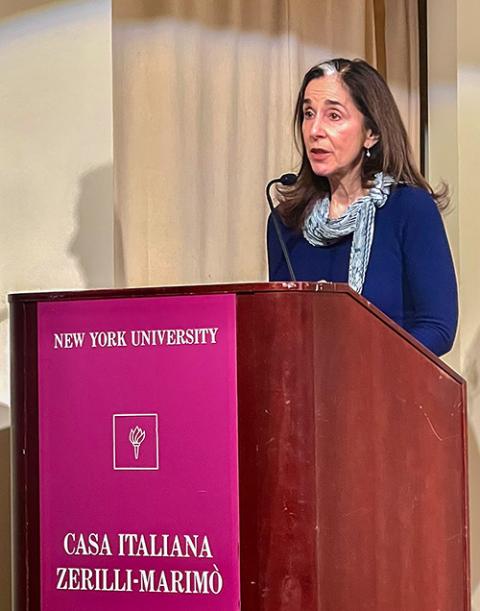
John Campitelli at his wedding in June 2005, with his reunited Italian birth mother, Francesca (in the blue dress), and his American adoptive parents, Barbara and Russell (last two on the right). "It was the first time that my biological family met my adoptive family," he said to NCR. (Courtesy of John Campitelli)
John Campitelli started searching for his birth mother when he was only 11 years old.
Born in 1963 in Turin, Italy, he was adopted two years later by an American Catholic couple in New York. For years, he believed his birth parents were dead, although no one had ever given him any explanation about why he was given up for adoption.
In 1991, after years of research, travel and rudimentary but efficient investigations, Campitelli discovered a shocking truth: His birth mother was still alive and had never had any intention of giving him up for adoption.
Mamma Francesca, as Campitelli later began to call her after they were reunited, was one of tens of thousands of Italian unwed mothers forced to give their children up for adoption between 1951 and 1969. In most of those cases, they had been lied to by nuns, Catholic midwives and social workers in Catholic hospitals called brefotrofi — institutes for "illegitimate children" (also labeled at the time as "little bastards") who had been conceived outside of marriage.

Maria Laurino presents her newly released book, The Price of Children, at New York University's Casa Italiana Zerilli-Marimò on Oct. 28. (NCR photo/Camillo Barone)
A new book, The Price of Children: Stolen Lives in a Land Without Choice, written by Maria Laurino, has revealed another startling truth: Of the thousands of children taken from unwed Italian mothers during those 20 years, about 3,700 were adopted by Italian American Catholic couples who were told by their local Catholic adoption programs that these children were orphans.
An Italian translation of this book was presented to Pope Francis on Nov. 14 along with a letter signed by the adoptees demanding truth and justice from the church.
The book reveals that these children were part of a system in which the Italian government, the Vatican and the U.S.-based National Catholic Welfare Conference, a leading organizational arm of the American Catholic Church, took children from their unwed mothers and put them up for adoption abroad using the Italian law of "anonymous surrender."
Laurino interviewed dozens of former unwed Italian mothers, now in their 80s or 90s, and adult U.S. adoptees in their 50s and 60s. She also unearthed hundreds of private letters between Italian and American church and Vatican officials and spoke to American and Italian former Catholic social workers.
Her investigation found that the unwed mothers were told their babies were dead or that they would only go into foster care, or that they were agreeing only to give them away for a limited period of time to alleviate their lives from poverty.
At the time, young women who had conceived children outside of official Catholic marriages risked being cut off from society if they raised their children as single mothers, or without the children's natural fathers. In some cases, women had become pregnant after being abused.
Frightened by the social stigma, the women's families forced them to move away from their towns to travel to brefotrofi in other regions and give birth. In many cases, the mothers did not see their children after giving birth. Others were allowed a few hours a day with their babies and then required to spend the rest of the day working in the same hospitals as punishment for their "sin" and to pay back the institutes' fees.
"The maternity hospitals ministered more to social than to medical needs, defending these women not against disease but against dishonor," wrote historian David Kertzer in Sacrificed for Honor, quoted in Laurino's book.
The system of anonymous surrender in Italy dates back to the Middle Ages, when the system of the ruota (wheel) was invented. Unwed and poor mothers could leave their illegitimate children in wooden wheels outside churches or maternity hospitals run by the church. The children would then be taken into care there and raised without parents, later introduced into forced monastic or consecrated life.
The Price of Children points out that until the late 19th century, health conditions in these maternity hospitals were extremely poor, with an infant death rate of around 50%. The book also claims that this system allowed the church to profit financially from these adoptions.

Maria Laurino signs a copy of her newly released book, The Price of Children, for an American adoptee who had just told her he knew about his condition thanks to her work, on Oct. 28 in New York. (NCR photo/Camillo Barone)
However, in an interview with NCR, Laurino said she does not believe that money was the motivating factor for the church to force unwed mothers to give up their babies. She said one of the church's concerns at the time was the growing influence of the Italian Communist Party and fear that if these children, boys in particular, stayed in the country, they could one day join the Communist Party and fight against the church.
The book took Laurino seven years to write and involved travel through the U.S. and Italy. It began when her first cousin — born in Italy to an unwed Italian woman and adopted by an American family in this Catholic program — casually mentioned John Campitelli. After finding his birth mother in 1991, Campitelli decided to devote his life to helping the rest of the Italian adoptees seek the truth.
Campitelli, who now works in Italy as a software specialist, founded a Facebook group called Italiadoption. The group is to help U.S. citizens who were adopted from Italy between 1951 and the 1970s investigate their origins. Campitelli told NCR that he has helped 485 adoptees. There is still a long way to go, he said.
'I grew up with secrecy and shame.'
—John Campitelli
Campitelli has been advocating for legislation in Italy that would grant adult adoptees access to their birth records. He is also working to repeal Italian laws allowing women to give birth anonymously. His goal is to establish adoptees' right to know their origins.
Campitelli's efforts reached the European Court of Human Rights, which condemned Italy in 2013 and ruled that adoptees must be allowed to file requests for birth records to the 29 Italian local juvenile tribunals.
Since then, Campitelli has continued lobbying Italian legislators to pass a law that would enable adoptees and their birth parents to reunite and uncover their identities. The Italian Catholic Church is in possession of all the past documents regarding the anonymous surrender of children from their mothers and it has not cooperated with U.S. adoptees' requests for access to the records, Campitelli said.
"I always believed that who I am and where I come from is a definite part of my identity construction process, and therefore I was fortunate enough to have a couple of parents, my adoptive parents, Russell and Barbara, were open enough to understand that, because they were very progressive," Campitelli said.
Advertisement
"I grew up with secrecy and shame and all the effort, for me, it feels like at the time that this story gets out, the truth can be told, that the time is ripe, and perhaps people and culture have finally come to a point in time where they're able to understand it and accept it."
Among the tens of stories collected and written in The Price of Children, Laurino also wrote about Campitelli's adoptive siblings, Sara and twin brothers Paul and David. Although Sara found out too late that her birth mother had died, she was able to reconnect with her family. She also discovered that her birth mother had never agreed to give her up for adoption and had suffered depression from what happened.
Campitelli's twin brothers died of AIDS in the 1990s after struggling with alcoholism and drug addiction. Their unwed birth mother also had alcoholism, but despite their incessant pleas and research, they never learned about it.
The book includes a letter written to church adoption authorities by their adoptive mother, Barbara Campitelli, in 1990 asking who the twins' birth parents were and to find out if the boys had been born with fetal alcohol syndrome. That, she said, "might have helped us to understand them better and have expectations for them within their capacities."
She did not get any response.

Pope Francis receives a copy of Maria Laurino's book The Price of Children from CBS producer Sabina Castelfranco, with a letter asking for truth and justice signed by a list of Italian adoptees. (Courtesy of Vatican Media)
"I'm very, very angry," Laurino told NCR when asked if she still considers herself Catholic today after all that she has covered, seen and heard.
She also said she is "furious about what's happened to women's reproductive rights" particularly with the Supreme Court's 2022 decision that overturned Roe v. Wade, which had legalized abortion in the U.S.
"I'm furious that this is happening because of the majority of Catholic Supreme Court justices," she added, acknowledging that her Italian American Catholic background no longer fully aligns with how she views the world today.
On Oct. 28, when Laurino was presenting her newly released book at New York University's Casa Italiana Zerilli-Marimò, an attendee took the microphone and after thanking Laurino for her book, said: "I happen to be one of these 3,500 [children], I figured this week," after he had watched the CBS "60 Minutes" segment on this story that aired Oct. 13.
Laurino personally thanked him for his testimony and signed a copy of the book for him. His search for the truth had just begun.








